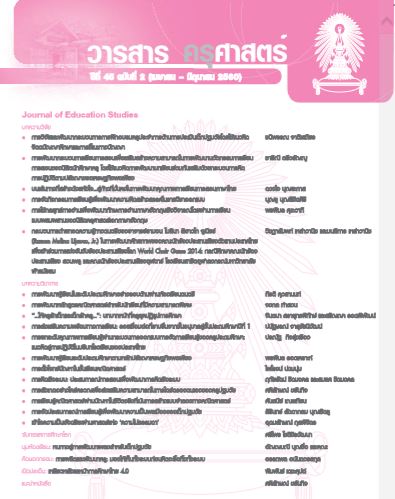การตั้งโจทย์ปัญหาในชั้นเรียนคณิตศาสตร์
Keywords:
การตั้งโจทย์ปัญหา, การแก้ปัญหา, PROBLEM POSING, PROBLEM SOLVINGAbstract
ทักษะการแก้ปัญหาเป็นเป้าหมายสำคัญของหลักสูตรและการจัดการเรียนรู้คณิตศาสตร์ การตั้งปัญหาเป็นแนวคิดที่ได้นักการศึกษาคณิตศาสตร์แนะนำให้ครูคณิตศาสตร์นำไปใช้ เพื่อพัฒนาหรือปรับเปลี่ยนการจัดการเรียนรู้คณิตศาสตร์เพื่อเสริมสร้างทักษะการแก้ปัญหาให้กับผู้เรียน การตั้งปัญหาคณิตศาสตร์ เป็นการกำหนดปัญหาคณิตศาสตร์ขึ้นมาใหม่จากบริบทซึ่งอาจเป็นข้อมูล สถานการณ์ หรือจากการปรับเปลี่ยนข้อมูลหรือเงื่อนไขจากปัญหาเดิม การตั้งปัญหาและการแก้ปัญหาเป็นกิจกรรมที่มีความเกี่ยวข้องกัน กิจกรรมการตั้งปัญหาสามารถดำเนินการควบคู่ไปกับการแก้ปัญหาซึ่งสามารถดำเนินการได้ทั้งก่อน ระหว่างและหลังการแก้ปัญหา ในบทความนี้ จะนำเสนอตัวอย่างกิจกรรมการตั้งปัญหา รวมถึงประเด็นที่ควรนำมาพิจารณาในการออกแบบและจัดกิจกรรมการตั้งปัญหา คือ ครูควรกำหนดบริบทของการตั้งปัญหาให้มีความหลากหลายทั้งที่เป็นบริบทคณิตศาสตร์และบริบทในชีวิตประจำวัน ให้ความสำคัญกับการตั้งประเด็นปัญหาหรือคำถามมากกว่าการหาวิธีการหาคำตอบของปัญหาที่ตั้งขึ้น การสนับสนุนและการช่วยเหลือของครูของขณะทำกิจกรรม และการกำหนดเวลาของการทำกิจกรรมให้เหมาะสม เพื่อเป็นแนวทางสำหรับครูผู้สอนคณิตศาสตร์ในการนำไปปรับใช้กับการจัดกิจกรรมการเรียนรู้เพื่อพัฒนาทักษะการแก้ปัญหาต่อไป
Problem solving skills are a major goal of mathematics curriculum and instruction. Educators recommend mathematics teachers use problem posing in the teaching and learning of math for enhancing students’ problem solving skills. Problem posing refers to the generation of new problems or the reformulation of previously given problems. Problem posing and problem solving are related activities. Problem posing is an integral part of problem solving and should not be emphasized separately from problem solving. It can be done before, between, and after a problem solving activity. This article presents examples of problem posing activities as well as recommendations on how to design and use problem posing activities in the classroom. Some suggestions to guide teachers are: select multiple contexts for problem posing in a mathematical and real life context; focus on posing questions or problems rather than finding a solution to the posed problem; support students during the activity; and plan appropriate time for each problem posing activity.




